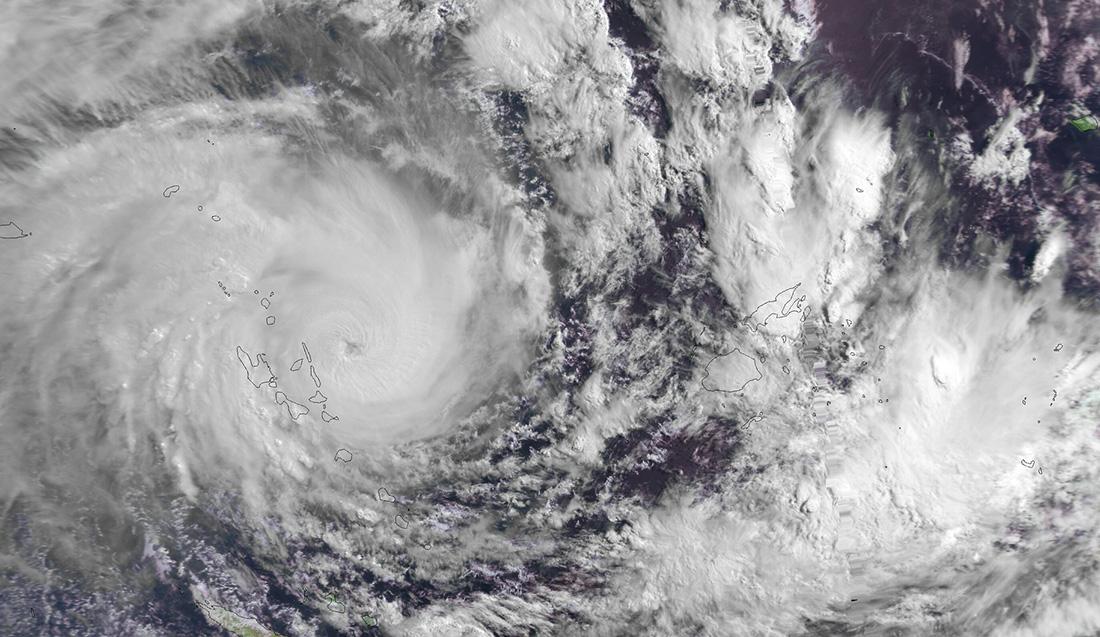
Cyclone Pam. Photo: 2015 EUMETSAT
In a significant step towards strengthening their resilience to climate change, Ethiopia, Tanzania and the Solomon Islands have collectively secured more than US$27 million from the Systematic Observations Financing Facility (SOFF) for developing comprehensive early warning systems. The investment from the United Nations multi-partner trust fund will go towards addressing critical gaps in their weather observation systems and enhance their capacities to predict and respond to climate-related hazards.
Climate information and early warning systems are key to safeguarding lives, livelihoods and a country’s development, particularly in the face of more frequent, intense and unpredictable extreme weather events.
In each country, the SOFF investment ($8.1 million, $9.9 million and $9 million for Solomon Islands, Ethiopia and Tanzania respectively) will see the establishment of new weather stations, the upgrading of existing ones, and significant improvements in ICT and data management systems. It will also enhance data sharing capabilities and provide crucial training for meteorological staff to boost the nations’ weather observation and forecasting capacity. The UN Development Programme will provide implementation support to the respective national meteorological authorities, with Norway, Denmark and Australia acting as peer advisors to Ethiopia, Tanzania and Solomon Islands respectively.
“We are entering an era where no country can go without an Early Warning System,” said Cassie Flynn, Global Director of Climate Change at UNDP. “This investment by the SOFF in Ethiopia, Tanzania and Solomon Islands will not only enhance their resilience to climate change, but also support critical sectors such as agriculture, water resources management, and disaster risk reduction, building on UNDP’s extensive adaptation portfolio.”
All three countries face major gaps in weather observations due to aging and inadequate monitoring infrastructure, a lack of trained personnel, and limited financial resources. All three countries also identify early warning systems as key priorities in their Nationally Determined Contributions under the Paris Agreement.
As a small island developing state, the Solomon Islands struggles with a sparse weather observation network and a shortage of skilled staff, leading to gaps in reliable weather data. Additionally, the archipelago nation lacks essential weather stations compliant with global standards, complicating accurate weather forecasting and climate monitoring efforts.
In Ethiopia, the national weather observation system is hindered by few functional weather stations, missing crucial night-time data, and inactive upper air stations due to shortages in essential supplies and skilled maintenance staff. Upgrades in technology and training are essential to improve data reliability and coverage.
Tanzania faces similar challenges with its weather warning systems due to outdated equipment and not enough weather stations. There is also a shortage of trained staff to manage these systems.
The Systematic Observations Financing Facility was co-founded by the World Meteorological Organization (WMO), UN Development Programme (UNDP) and UN Environment (UNEP) in 2021. With a particular focus on the world’s Small Island Developing States and Least Developed Countries, it is a crucial delivery vehicle of the UN Secretary-General's Early Warnings for All initiative, which aims to see every person on Earth protected by early warning systems by 2027.
The approval of funding brings the number of UNDP-supported projects to be supported by the SOFF to four, with Rwanda securing $3.1 million towards improving climate information and early warning systems in late 2023.
For further information, please contact:
Kate Jean Smith, Communications Specialist, Climate Change Adaptation, UNDP Climate Kate.smith@undp.org
Benjamin Larroquette, Global Advisor on Early Warning Systems and Regional Technical Advisor, Climate Change Adaptation, UNDP benjamin.larroquette@undp.org
About UNDP
The United Nations Development Programme (UNDP) is the leading United Nations organization fighting to end the injustice of poverty, inequality, and climate change. Working with a broad network of experts and partners in 170 countries, UNDP helps nations to build integrated, lasting solutions for people and planet.
As of 31st October 2023, since 2002, UNDP has completed 94 CI/EWS initiatives benefitting over 9.4 million people in over 64 countries, including 38 Least Developed Countries and 13 Small Island Developing States. Of these, over 2.77 million people have increased access to CI/EWS with the installation of over 157 Early Warning Systems and 1,950 units of meteorological equipment installed or upgraded. UNDP is currently implementing a CI/EWS portfolio of approximately US$800 million across more than 35 countries.

